Travel to Antarctica, an unearthly polar dreamscape
Travel to the frozen continent exposes visitors to the realities of life, and death.
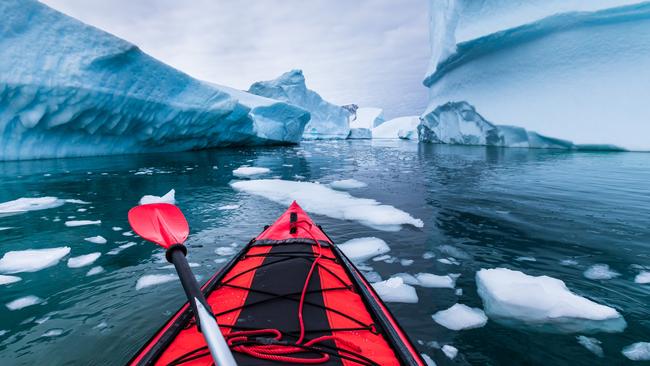
“How slowly the time passes here, encompassed as I am by frost and snow.” On my first morning in the Antarctic it’s this line from Mary Shelley’s Frankenstein that comes to me, unbidden, long before I begin ruffling through my notebook for passages about the frozen landscape. I’ve been collecting chronicles from the heroic age of Antarctic discovery written by Apsley Cherry-Garrard, who was on Robert Falcon Scott’s ill-fated Terra Nova expedition of 1912, and our own Douglas Mawson, who that same year survived improbable odds. Scott, in contrast, did not.
It’s a measure of the Antarctic’s otherworldliness that Mary Shelley’s rather stylised phrases hit the right note, seeming to ring more true than truth, as I catch my first glimpses of the Great White South. Frankenstein was inspired by a dream and it opens with a journey to the Arctic and a sighting of the monster on the ice pursued by its creator, Victor Frankenstein. It’s a brilliant strategy on Shelley’s part; having followed her to the unearthly polar landscape, the reader is primed for the fantastical nature of the unfolding tale. By placing her readers first in an unreal world, the unreality of what follows seems somehow quite believable.
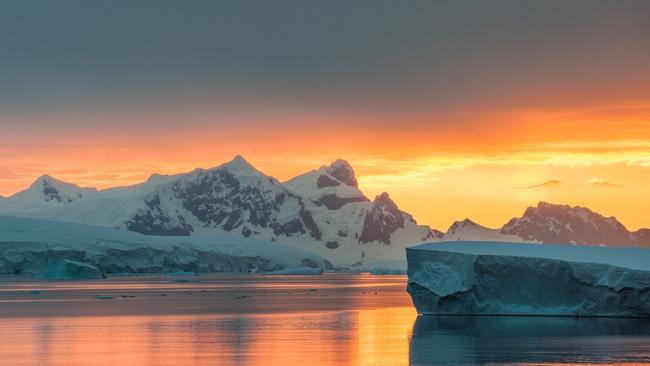
I see this all clearly as we slice our way through an ocean marbled with bergy bits on a tranquil, mist-shrouded Weddell Sea, with penguins porpoising on all sides and a pod of killer whales stealthily circling one of the large tabular bergs.
The clouds are low, the air still, and everything hushed but for the cries of delight when we sight a blue whale, the largest mammal on the planet, and a lone young male emperor penguin hundreds of kilometres from where he should be. It’s too much for some passengers, who burst into tears.
That first morning, the passage of time seems like no kind of time at all. A mere morning surpasses the richness of an entire day. Towards the close of a near endless Antarctic summer day it feels as if I have just lived a week. But it’s not as if I’m wearied by the intensity. I’m enlivened by it. Each moment has its own memorable weight and texture. I’m hungry for more.
Several days later, we sail towards an Antarctic sunset well after midnight. The setting sun glows like coals ahead, on the starboard side, between icy peaks. Those at the bar rush out on deck with smartphones raised, oblivious to the stiff breeze, immune to the subzero chill. When someone spots another dab of rosy twilight on the port side, behind the ship, we rush to photograph this second sun. Sailing around an abstracted polar dreamscape in untold variations of blue, black and white, we are so discombobulated that none of us pauses to contemplate whether a solar doppelganger is, in fact, possible in this universe.
It turns out to be a reflection of the first sunset, projected across a grey ocean onto a wall of ice.
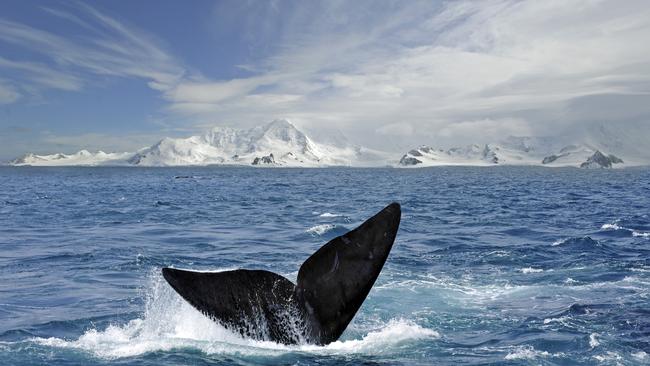
My own unusual path to the Antarctic no doubt contributes to the air of unreality. A week earlier, I was in the Arctic, about 69 degrees north, just in time to catch the first glimpse of the polar sun after its long seasonal hibernation. For a good view I climbed up an observation tower three storeys high. The weak sun rose shyly and set about 20 minutes later, as if it were old or tired or not ready to be seen. It was hard to imagine that the same sun, for about six weeks in high summer, will soar in the Arctic sky undimmed by twilight.
A week later, I left the Arctic Circle, flew to Helsinki, took a few days in St Petersburg and continued my journey along the meridian. From Frankfurt, I flew to Buenos Aires; from there to Patagonian Ushuaia. And after a two-day sail across the Drake Passage I was in Antarctica, very much aware of my small place in the vast mystery of things. At the same time I feel, paradoxically, as if I’ve just taken the measure of my planet. It’s as if by traversing it I know it; a common human error. To see one pole is a blast, to see both a week apart is positively freaky. It’s a once-in-a-lifetime journey in an exalted sense, and in a banal one, too. I doubt I’d have the energy for a repeat performance. So this summer just past, I content myself with a return to the Antarctic. Once there my path will be much the same as the previous summer — an itinerary of scenic highlights along the Antarctic Peninsula, a claw-like extension of the frozen continent reaching towards the tip of South America. But this time I decide to mix it up.
A year ago, though I took every landing offered and tramped along icy shores and snow-clad hills, I spent most of my time on the ship. This time around I take to the water. Easing into a kayak, I slip away with a small group from the ship, hugging the shore of an ice block of an island.
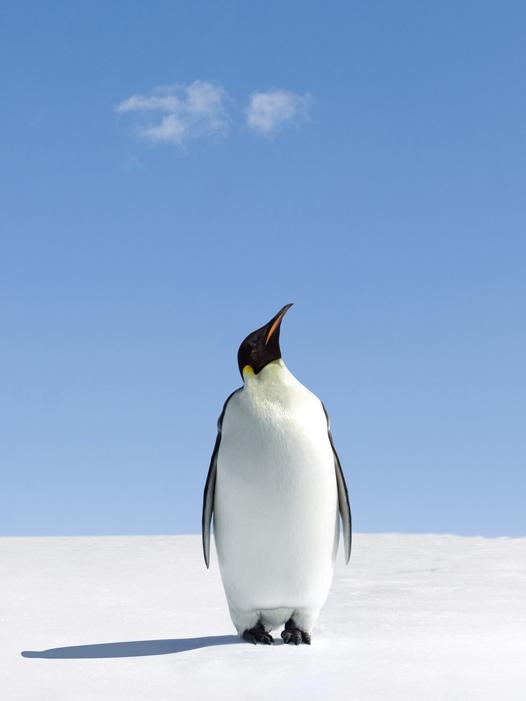
It’s early evening and the penguins, whose rookeries rim the rocks, smearing them with pungent, rust-coloured guano, are in full voice and good cheer. Slug-like crabeater seals doze on low-lying bergs, raising their heads warily as we paddle past.
I notice a liquid black mass sliding silently among the growlers and shards of blue ice at the shoreline. It’s a leopard seal that surfs on to the pebble beach and props itself there on splayed flippers among the penguins, which part into a horseshoe.
A leopard seal will kill a penguin for food, or sport, but this one has washed up on a steep stretch of beach and as it lunges it seems to rock from side to side without any real forward motion. Two more ungainly species on land could scarcely be imagined. Of course it is nature’s way, but I’m barracking fiercely for the penguins, and then I lose sight of the duel when I paddle past a large glowing berg with a perforation like an angular porthole, cyan on the outside and cobalt deep within.
Down here, on the water, at creature level, I find a cure for the dreamy unreality of my first trip. It’s connected, I realise, to the improbably luxurious life on board. Of course I’m grateful for the constant climate, the fine food and wine, the lectures and the bar. But, while kayaking, I’m exposed to the realities of life, and death, in the Antarctic. Penguins thread through the water beneath me, seals follow in their wake, and for a magical moment a humpback whale glides serenely by.
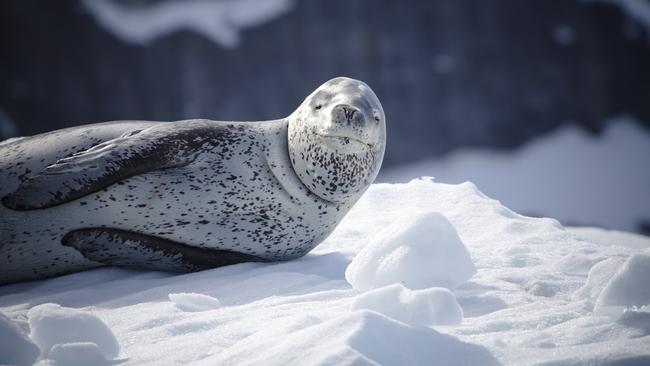
If a tower of ice should calve from a glacier I would likely, if kayaking too close, disappear beneath it forever. To a predatory killer whale, I am just a curiosity on the water’s surface, easily upturned by the flick of a tail. In my toe-to-neck dry suit I might look rather like a portly seal. The suit itself is a technological marvel, but I’m acutely aware as the temperature begins to fall quickly of how dependent I am on all the stuff made to make us almost superhuman. And how precarious, in a way, our defences against nature are.
A month after I return from the deep south, the world will be swept up in a contagion that brings home, with a calamitous shock, the fragility of our own biology, our nature. But for now all I know is that the weather is changing. And I’m cold. It begins to snow, fat flakes tumbling out of a cement-coloured sky. My gloves are drenched, my hands numb, red and swollen. It’s time to come in.
A year and a few months after my first trip to the Antarctic, I think again about Mary Shelley and her nightmare of human hubris and its consequences, of a man named Frankenstein who dared to play God; last seen in her tale pursuing his monstrous creation across a dreamscape of frost and snow.
Luke Slattery’s most recent book is Mrs M (HarperCollins), an imagined history of Governor Lachlan Macquarie’s wife, Elizabeth.

To join the conversation, please log in. Don't have an account? Register
Join the conversation, you are commenting as Logout